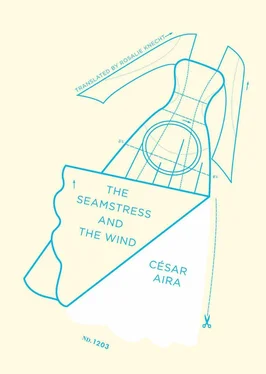“Don’t worry about it. I’m very good at finding lost needles in Patagonia.”
“What I don’t know is what to do in the meantime.”
“I never get bored,” said the wind.
“Neither do I, when I’m at home. But here. .” she whimpered again.
“I already told you I can bring you your house, with everything in it.”
“No, no. . I don’t want it!”
She could think of nothing more depressing than her house set there in the middle of the desert; for her the house was the street too, the neighbors, the neighborhood. Offering her the house by itself was like trying to pay her with an inconceivable one-sided coin.
“We’d be very comfortable, Delia, you here in your house, cleaning, cooking, sewing. I would keep you company, bring you everything you wanted. . we would live happily, safely. .”
Delia was terrified. Ventarrón’s intentions were becoming clear, and they filled her with dread. Was it possible that a meteorological phenomenon had fallen in love with her? And besides, he was contradicting himself: how was she going to be safe? There was an insane truck driver, and on top of that a monster out to destroy her! It was not a very soothing perspective. And there were her husband and son. She didn’t want to talk about that with the wind, but he brought the subject up.
“Would you like your husband to come get you?”
“. .”
“He won’t be able to, Delia. He tried, but his vice intervened (you already know what I’m talking about), and he lost the truck.”
“Really?”
“And he won’t be able to get it back. That little red truck you were so accustomed to is now invisible, and no one will ever drive it again. Ramón Siffoni has been left on his feet forever.”
I will never return to Pringles! thought Delia with desperation. She hated the wind for his sadism.
“I have to ask you something, Delia. Are you in love with your husband? Did you marry for love?”
“And why else would I get married?”
“To keep from ending up an old maid.”
She didn’t deign to respond. She might not have been able to even if she’d wanted, because she had a knot in her throat.
“Do you love him?”
“Yes.”
“But you’ve never told him so.”
“It’s not necessary in marriage.”
“How unromantic you are!” A pause. “Do you want to tell him?”
In a fit, Delia forgot her prudence.
“If only he were here I’d tell him! If only!”
“He doesn’t have to be here. I could carry your words to the other side of the world, if necessary.” Another pause. The wind waited. “Tell him. Be brave and tell him.”
Delia raised her head and looked at the horizon, out there at the end of the plateau. It all seemed very small, and yet she knew it was very big. Could her voice cross it? Her voice was in her husband’s heart. . How big the world was! And how far away she was! Where had she come to rest? She would never go back to Pringles! Never!
“Ramón. . ” she said, and the wind roared and was gone.
I’M SITTING IN a café on the Place de Clichy. . At this point I remain here against my will. I should have left a while ago, I have a commitment. . But I can’t call the waiter, I simply can’t do it, it’s stronger than I am, and the minutes are passing. . I’ve reviewed the bill and my pocket several times, I’ve counted the coins from back to front and front to back and I come up short by a hair, I have six francs and ninety centimes and the coffee costs seven, it’s as if it were done on purpose. . That’s why I need the waiter to come, he’s going to have to give me change for fifty francs, I don’t have anything smaller. . If I had enough coins I would leave them on the table, free as a bird I would leave these little metal eggs and fly away. My impatience is so great that if I had a ten franc note I would leave it. . But I don’t. I’m reduced to waiting for him to look at me so I can make some gesture, wave him over. . it’s the same here as everywhere in the world: waiters never look your way. My eyes are fixed on him, every turn he makes I try out my gesture. . By now all the customers must have noticed, and the other waiters, of course, all except him. Let’s see. . He’s coming this way. . no, again I failed, I must have the air of a supplicant, I’m stuck to my chair. . I move it, I scrape the legs against the floor, to make him look at me. . I know going after him would be useless as well as grotesque, he’d slip away. . Then, I would become the invisible man, yes, the ghost of the Place de Clichy. There’s nothing to do but wait for the next opportunity, hope that he turns this way, that he clears the table next to mine and sees me. . And I want to go, I have to go, that’s the worst. . I’ve been here for two hours writing at this table (he must think that if I stayed two hours, I could just as well stay three, or five, or until they close), and in the enthusiasm of inspiration, which I’m cursing now, I went on and on until I’d finished the previous chapter. . and when I looked at the clock I wanted to die. . I should already be at that dinner, they’ll be waiting for me — for me, stuck here. . I have twenty minutes on the Métro at least, and the minutes pass and I keep searching for the waiter’s gaze. . I don’t know how I can be writing this, if I’m not taking my eyes off his head. .. Every time I put in an ellipse I make holes in the notebook. This is beginning to look definitive: he’s never going to look at me, ever. Have I been trying for ten minutes? Fifteen? I don’t want to look at the clock any more. I stare at him like a maniac. . The law of probabilities should be in my favor, at some point he should look at me, since he can’t help looking at something. . And to think it would have been so easy to make him come over as soon as I saw the time: calling him would have been enough. So many people do it. . But I can’t. Never in my life have I called a waiter except by mute craft (and I have written all my novels in cafés), I’ve never done it, I will never do it. . never. . And then an ardent recrimination of my Creator rises in me — mute of course, internal, though I pronounce and hear it with the greatest clarity:
“Lord, what did You give me a voice for if it’s no use to me? Along with my voice, shouldn’t You have given me the capacity to use it? How hard would that have been? Don’t You think it’s sarcastic, almost sadistic, to make me the owner of this marvelous instrument that passes from the immobile body through the air like a messenger and which is the body in another form, the body in flight. . and wrap that voice up in me, under a spell of interiority? It’s as if I’m carrying a corpse inside, or at least an invalid, or a guest who won’t leave. . I suppose as a newborn I could scream to call my mother like anybody else. . but then what? My voice has atrophied in my throat, and when I speak — and I only speak when spoken to, like a ghost — what comes out is an adenoidal and affected stammer barely adequate for carrying my ignorance and doubts across very short distances. If You’d at least made me mute, I’d be calmer! Then I could yell, and I’d yell all the time, the sky would be full of my dumb howling! You’ll say I’ve abused my reading of Leibniz, Lord, but don’t You think, given the circumstances, You should move the waiter’s head in such a way that he might see me?”
Delia, my reality. . Talking to you now, in my silence, does your story not resemble mine? It’s the same, it matches in each iridescent turn. . What in me is a miniscule incident, in you becomes destiny, adventure. . And yet the two things are not dissimilar; rather, one is a rearrangement of the other. It’s not the volume of the voice that matters, but its placement in the story where it’s spoken; a story has corners and folds, proximities and distances. . A word in time can do everything. . And more than anything else (but it’s all the same) what matters is what’s said, the meaning; in the arrangement of the story there is a silver bridge, a continuum, from voice to meaning, from the body to the soul, and the story advances by that continuum, by that bridge. .
Читать дальше












